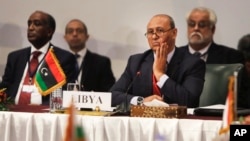Libya's political and military conflict heated up Monday after the Islamist coalition which controls the capital, Tripoli, appointed a new prime minister and declared the newly-elected parliament null and void. The prime minister already in office, Abdullah al-Thani, responded by calling the Islamist forces in Tripoli “tyrants” and insisting they could not govern the country by force.
Libya's rival political forces threw down the gauntlet at each other Monday as their political and military feud intensified.
Newly re-appointed Prime Minister Abdullah al-Thani told journalists in the eastern Libyan city of Tobruk that the Islamist Fajr militia, which captured the capital's airport on Saturday, is trying to “impose its will by force” and that its political moves are “illegal.”
"I oppose anyone who tries to divide the country and the attempt by Nouri Bou Sahmein, speaker of the old General National Congress, to appoint a new government is null and void, since Bou Sahmein is now an ordinary citizen with no authority to appoint anyone," said al-Thani.
Thani added that any meeting of the former assembly is illegitimate. He said Libya's new parliament, elected in June, is the only body with the authority to appoint and that all Libyans should unite around it.
Thani accused the Fajr militia of behaving in a “dictatorial manner” reminiscent of the late ousted strongman, Moammar Gadhafi. The government, he insisted, could “no longer operate in Tripoli” due to insecurity and he blasted Fajr militiamen for allegedly setting fire to his home and office.
Earlier, pro-Islamist political leader Omar Hmaidan gave a press conference in Tripoli declaring the replacement of Thani.
"Abdullah al-Thani has been removed from his positions as caretaker prime minister and defense minister and that Omar Suleiman Salah al-Hassi has been appointed to form a new national government in the next week, after taking the oath office before National Congress speaker Nouri Bou Sahmein," said Hmaidan.
Bou Sahmein, an Islamist, has locked horns repeatedly with liberal political leaders including Libya's former prime minister Ali Zeidan. Bou Sahmein led the move to oust Zeidan last March.
Meanwhile, in Cairo, Libya's neighbors met to discuss the conflict and called for national dialogue to end Libya's violence. Egyptian Foreign Minister Sameh Shoukri said the regional grouping had agreed to oppose any sort of outside intervention.
"The parties had agreed to respect Libya's unity and sovereignty and to refuse any outside interference in the country's internal affairs, promoting national dialogue to solve the ongoing conflict and to put an immediate stop to all armed violence," said Shoukri.
Libyan TV, which is now controlled by the Islamist forces in Tripoli, announced that outgoing army head Abdel Salam Jaballah al Obeidi, who was removed over the weekend by the Libyan parliament in Tobruk, would remain in office.
The station also claimed that Libya's judiciary had agreed to the reinstatement of the old General National Congress, due to what the TV report called “the current political void.” The GNC's official mandate expired last February. The new parliament was elected in June and began to meet last month.
Meanhwile, the U.S. State Department, along with Britain, France, Germany and Italy, issued a statement Monday saying actions by outsiders exacerbate divisions in Libya and undermine democracy.
Those five allies strongly condemn fighting in such major cities as Tripoli and Benghazi, especially in residential areas, and urge all parties to accept a cease-fire and put together an inclusive government.










